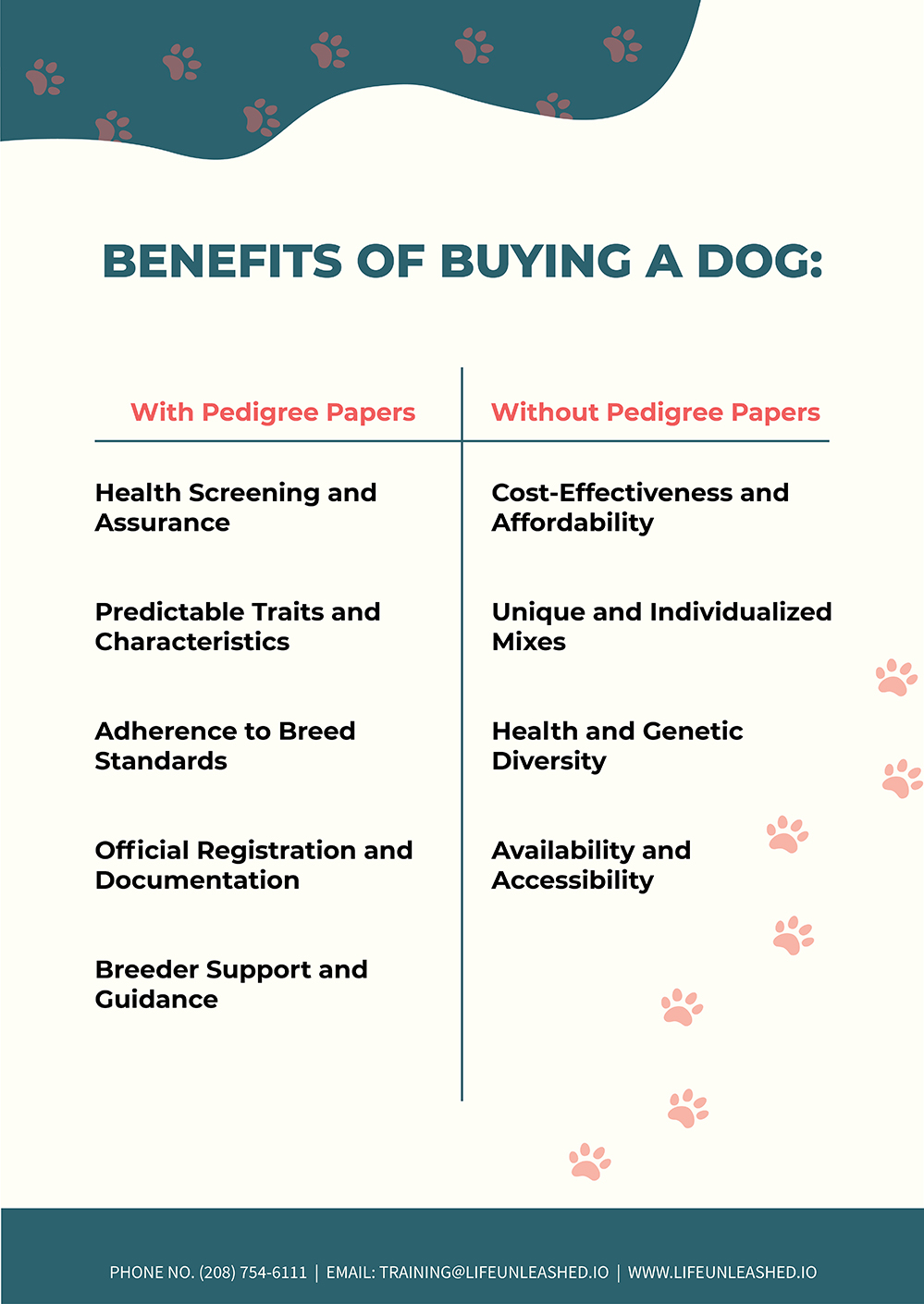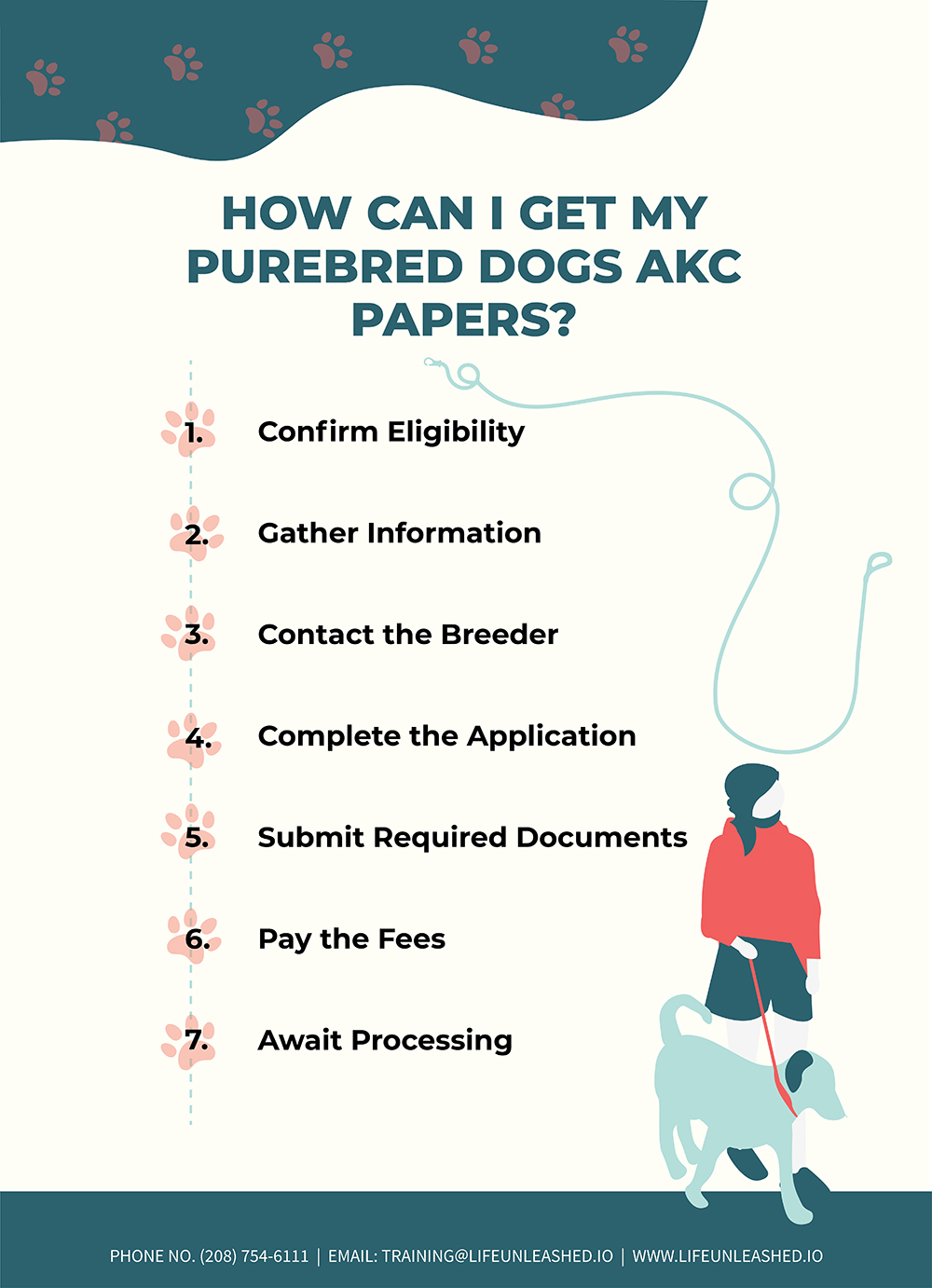Getting a dog is usually such an exciting journey, isn’t it? But wow, it can also be super overwhelming with all the choices out there! You’re probably thinking, “Where do I even start?” Well, one big decision you’ll need to make is whether to go with a fancy breeder who gives you all the dog pedigree papers or just go with a dog without all that official stuff. Trust me, both ways have their perks and uses.
Let’s dive into the awesome benefits of each option to help you figure out what’s best for you and your furry friend-to-be!
Benefits of Buying from a Reputable Breeder with Pedigree Papers
1. Health Screening and Assurance: Reputable breeders always prioritize the health and well-being of their dogs. They often conduct comprehensive health screenings and genetic testing on their breeding dogs to identify and reduce potential hereditary health issues. By purchasing a puppy with pedigree papers from such breeders, you gain assurance regarding the dog’s health background. It gives you the confidence that there is reduced likelihood of inherited diseases and the puppy is overall in good health.
2. Predictable Traits and Characteristics: Dog pedigree papers provide valuable insights into a dog’s lineage, including information about its parents and grandparents. This documented ancestry offers predictability in terms of the dog’s size, appearance, and temperament. Understanding the breed’s characteristics helps in selecting a dog that aligns with your lifestyle, preferences, and expectations. Whether you’re seeking a loyal companion, a reliable working dog, or a show competitor, pedigree papers can guide you in making an informed choice.
3. Adherence to Breed Standards: Dogs with pedigree papers typically meet the established breed standards set by kennel clubs or breed organizations. These standards outline the desired characteristics and traits specific to each breed, including physical attributes, temperament, and behavior. Purchasing a dog with pedigree papers ensures that it closely matches the breed’s standard, maintaining the integrity and authenticity of the breed. Whether you’re interested in conformation shows or simply value the breed’s unique qualities, pedigree papers signify the dog meets these standards.
4. Official Registration and Documentation: Pedigree papers serve as official documentation of a dog’s lineage and registration with recognized kennel clubs or breed organizations. This documentation is essential for participating in various dog-related activities, such as conformation shows, obedience trials, agility competitions, and breeding programs. It not only confirms the dog’s pedigree but also enhances its value and credibility within the breeding community. Moreover, registered pedigree dogs contribute to the preservation and promotion of their respective breeds, ensuring their long-term viability and recognition.
5. Breeder Support and Guidance: Reputable breeders prioritize the well-being of their puppies even after they leave their care. They offer ongoing support and guidance to puppy buyers, assisting them in raising healthy, well-adjusted dogs. This support extends beyond the initial purchase, encompassing advice on training, socialization, nutrition, grooming, and healthcare. By choosing a breeder with a commitment to responsible breeding practices and customer support, you gain access to a valuable resource that facilitates your journey as a responsible dog owner.

Advantages of Buying a Dog Without Pedigree Papers
1. Cost-Effectiveness and Affordability: Dogs without pedigree papers are often more affordable than their purebred counterparts. This cost savings can be particularly appealing to individuals or families on a budget or those prioritizing other expenses. While the absence of pedigree papers may raise questions about the dog’s lineage, health, and background, it can also offer an opportunity to provide a loving home to a deserving dog in need.
2. Unique and Individualized Mixes: Many mixed-breed dogs exhibit unique combinations of traits inherited from different breeds. These dogs, often referred to as “mutts” or “designer dogs,” possess a distinct blend of characteristics that make them one-of-a-kind. From their appearance to their personality, mixed-breed dogs offer a delightful surprise, embracing diversity and individuality. Whether you’re drawn to the charm of a quirky mutt or the allure of a trendy hybrid, adopting a dog without pedigree papers opens doors to endless possibilities and discoveries.
3. Health and Genetic Diversity: Mixed-breed dogs benefit from a broader genetic pool compared to purebred dogs, which may be susceptible to certain inherited health issues due to genetic bottlenecks. By combining genetic material from multiple breeds, mixed-breed dogs exhibit greater genetic diversity, potentially reducing the risk of inherited disorders. While health considerations still apply, mixed-breed dogs may enjoy better overall health and resilience, offering longevity and vitality to their owners.
4. Availability and Accessibility: Mixed-breed dogs are often more readily available than purebred dogs with pedigree papers. They can be found in shelters, rescue organizations, foster homes, and through private individuals seeking to rehome their pets. Adopting a mixed-breed dog provides an opportunity to save a life, alleviate overcrowding in shelters, and support ethical and responsible pet ownership. Additionally, the diverse range of mixed-breed dogs ensures that you’ll find a companion suited to your preferences, whether you’re looking for a small lap dog, an energetic playmate, or a loyal guardian.
How can I get my purebred dog AKC papers?
Now that the we understand the benefits of AKC registration, you may be wondering if it is still possible to get your purebred dog registered if it didn’t recieve registration papers from the breeder because the litter wasn’t registered?
Well, the simple answer is “No”.However, there’s the Purebred Alternative Listing (PAL) program available for you to register your dog, allowing participation in AKC Companion and Performance Events.

On the other hand, if you’re fortunate to have a dog from an AKC registered litter, the general process for official registration is as follows:
Confirm Eligibility: Before registering your dog with the AKC, ensure your furry friend is purebred and meets the AKC’s breed standards. Eligibility requires your dog to be born to an AKC-registered mother (dam) and father (sire) of the same breed.
Gather Information: Collect all necessary details about your dog, such as its full registered name, date of birth, gender, color, and markings. Additionally, you’ll need the AKC registration numbers of the dog’s parents.
Contact the Breeder: If you obtained your dog from a breeder, they should have provided registration papers or information on obtaining them. Reach out to the breeder for guidance on the registration process and any required paperwork.
Complete the Application: Navigate to the AKC’s website and locate the registration section . Find the appropriate application form, like the “Individual Dog Registration Application” or “Litter Registration Application,” and accurately fill it out.
Submit Required Documents: Alongside the application form, provide supporting documents such as the dog’s pedigree, verifying its lineage for at least three generations. Ensure the pedigree includes the registered names and numbers of the dog’s parents, grandparents, and great-grandparents.
Pay the Fees: AKC registration incurs a fee, which may vary depending on circumstances. Check the AKC’s website or contact customer service to confirm the current registration fee and accepted payment methods.
Await Processing: After submitting the application and necessary documents through the proper channels, allow several weeks for the AKC to process your registration. They’ll review the provided information and verify your dog’s eligibility. Once approved, you’ll receive the AKC papers for your dog via mail.
If you encounter difficulties or have specific inquiries about the registration process, don’t hesitate to reach out directly to the AKC. They’ll offer guidance and address any uncertainties you may encounter.
Conclusion
It’s important to acknowledge that the benefits associated with pedigree papers primarily cater to individuals seeking purebred dogs with specific characteristics and intentions to participate in dog-related activities. However, mixed-breed dogs offer their own set of advantages and appeal to a broader audience seeking unique, healthy, and loving companions.
Regardless of whether you choose a dog with or without pedigree papers, the most important thing is to obtain your pet from a responsible and ethical source. Conduct thorough research, visit shelters or reputable breeders, ask pertinent questions, and evaluate the dog’s health, temperament, and compatibility with your lifestyle.
Remember that each dog, regardless of its pedigree, deserves a loving home and a lifetime of care and companionship. By making a well-informed decision and prioritizing the welfare of the dog, you’ll embark on a rewarding journey filled with joy, loyalty, and unconditional love.
Now that you’ve finally found your dream puppy, what comes next? Here’s your step by step Ultimate Guide to Achieving Puppy Training Excellence.
FAQs about AKC Certification
What are pedigree papers, and why are they important?
Pedigree papers are documents that detail a dog’s lineage, including its ancestors and breed heritage. They’re important for verifying a dog’s breed purity and ancestry.
How to get pedigree papers for my dog
Pedigree papers are typically provided by reputable breeders upon purchase of a purebred dog. The breeder should register the litter with a recognized pedigree registry like the AKC (American Kennel Club) and provide the papers accordingly.
What information is typically included in pedigree papers?
Pedigree papers include details such as the dog’s breed, date of birth, registration number, and lineage information, including the names and registration numbers of its ancestors.
Can I trust the authenticity of pedigree papers provided by a breeder?
Authentic pedigree papers are provided by reputable breeders who register their dogs with recognized pedigree registries. It’s important to ensure the legitimacy of both the breeder and the registry.
Do pedigree papers guarantee the health or quality of a dog?
No, pedigree papers indicate lineage but do not guarantee a dog’s health or quality. Additional health screenings and evaluations are necessary to assess a dog’s overall well-bein
Are pedigree papers necessary if I only want a pet and not a show or breeding dog?
No, buying a dog without papers is acceptable. Pedigree papers are not strictly necessary for owning a pet, but they may provide assurance of breed purity and can be useful for certain purposes like breeding or participating in dog shows.



